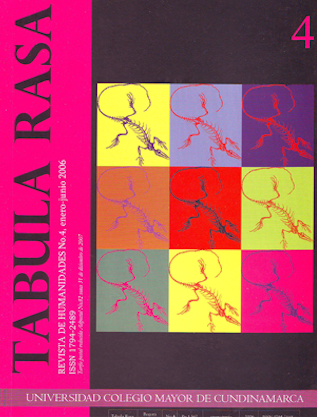Mostrar biografia dos autores
El problema de los «fundamentos» es decisivo para cualquier area de estudio, tal vez particularmente para un área con un posible repertorio de fuentes elementales tan variado como el estudio de políticas mundiales. En este trabajo yo quiero llamar la atencion a algunas maneras diferentes de pensar sobre donde y como se produce el conocimiento; como el conocimiento que circula puede ser usado para informar nuestro entendimiento sobre las geografías del conocimiento en políticas mundiales. Estas geografías, sin embargo, no son fines en si mismos. Es importante entender las bases ontológicas del saber, desde perspectivas que no privilegian una sola historia del conocimiento asociada con una región específica del mundo, o de opiniones sobre conocimiento que implícita o explícitamente presumen su universalidad auto-evidente.
Visualizações de artigos 65 | Visitas em PDF 47
Downloads
Agnew, J. 2005. Hegemony: The New Shape of Global Power. Filadelfia: Temple University Press.
Asquith, P. 1996. «Japanese science and western hegemonies: primatology and the limits set to questions», en L. Nader (ed.) Naked Science: Anthropological Inquiry into Boundaries, Power, and Knowledge. Nueva York: Routledge.
Biersteker, T.J. 1995. «The “triumph” of liberal economic ideas in the developing world» en B. Stallings (ed.) Global Change. Regional Responses: The New International Context of Development. Cambridge: Cambridge University Press.
Brennan, T. 2006. Wars of Position: The Cultural Politics of Left and Right. Nueva York: Columbia University Press.
Casey, E. S. 1996. «How to get from space to place in a fairly short stretch of time» en S. Feld y K.H. Basso (eds.) Senses of Place. Santa Fe NM: School of American Research Press.
Haraway, D. 1989. Primate Visions: Gender, Race and Nature in the World of Modern Science.
Nueva York: Routledge.
Heidegger, M. 1987. Introduction to Metaphysics. New Haven: Yale University Press.
Hönnighausen, L. 2005. «Where we are? Some methodological reflections on space, place, and postmodern reality» en K. Benesch y K. Schmidt (eds.) Space in America: Theory/History/ Culture. Amsterdam: Rodopi Press.
Lauer, D. 2005. «”America and Russia are the same:” geopolitics in Heidegger’s» Seinsfrage. Telos, 132:132-50.
Livingstone, D.N. 2005. «Science, text and space: thoughts on the geography of reading» Transactions of the Institute of British Geographers, NS 30:391-401.
Lowenthal, D. 1961. «Geography, experience, imagination: towards a geographical epistemology» Annals of the Association of American Geographers, 51:241-60.
Massey, D. 2005. For Space. Londres: Sage.
Mignolo, W.D. 2000. Local Histories/Global Designs: Coloniality, Subaltern Knowledges, and Border Thinking. Princeton: Princeton University Press.
Pombeni, P. 2005. «Political models and political transfer in the shaping of Europe» European Review of History, 12:223-38.
Said, E.W. 1978. Orientalism. Nueva York: Harper.
Said, E.W. 1991. «Traveling theory» en The World, The Text and the Critic. Londres: Vintage.
Wright, J.K. 1947. «Terrae Incognitae: the place of the imagination in geography» Annals of the Association of American Geographers, 37:1-15.




